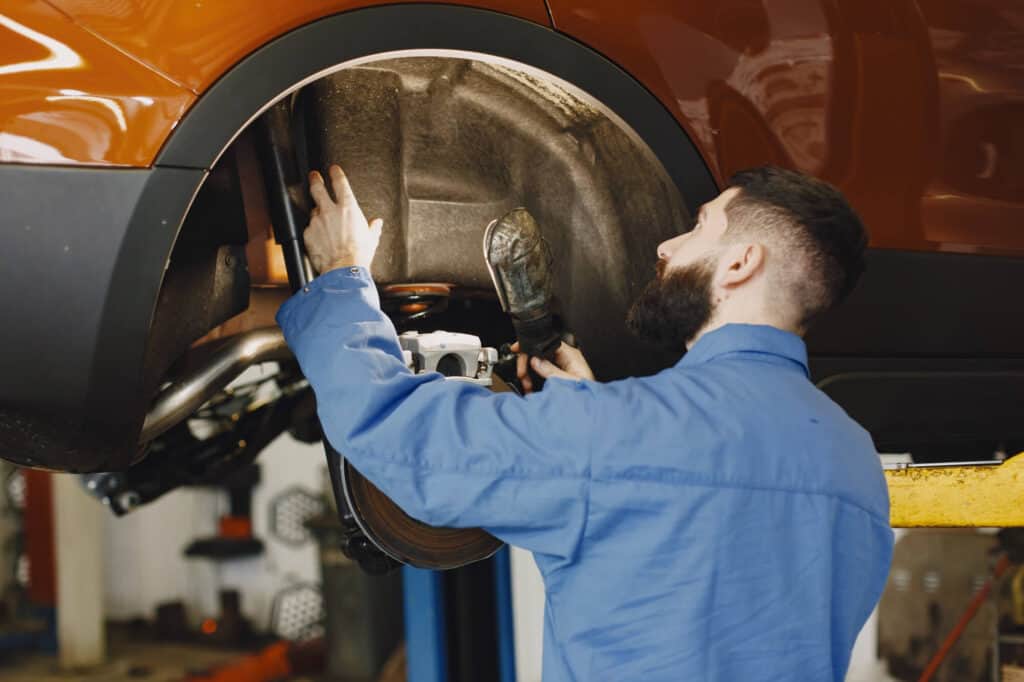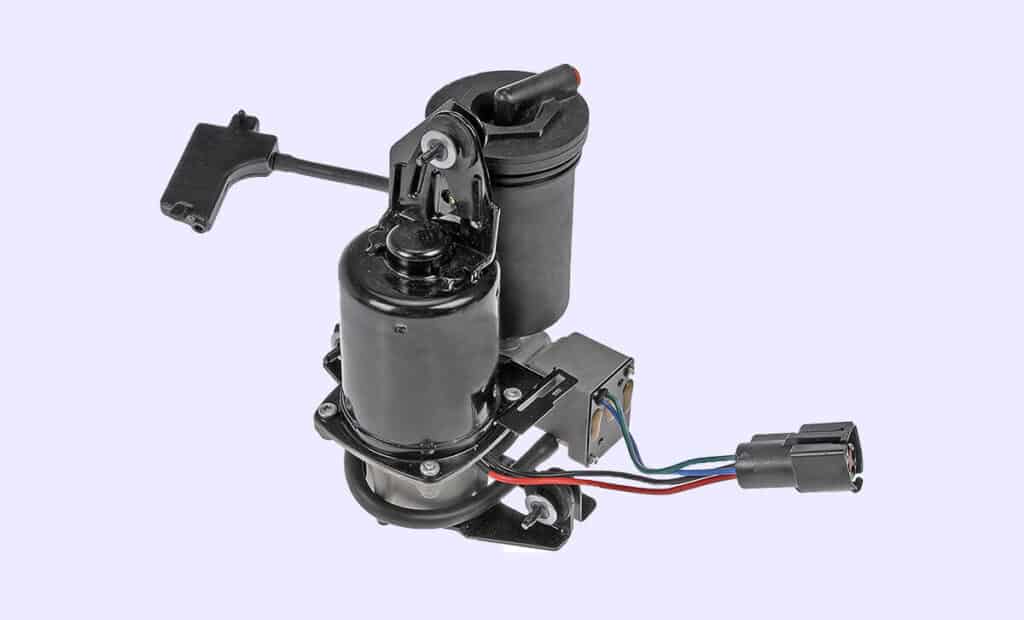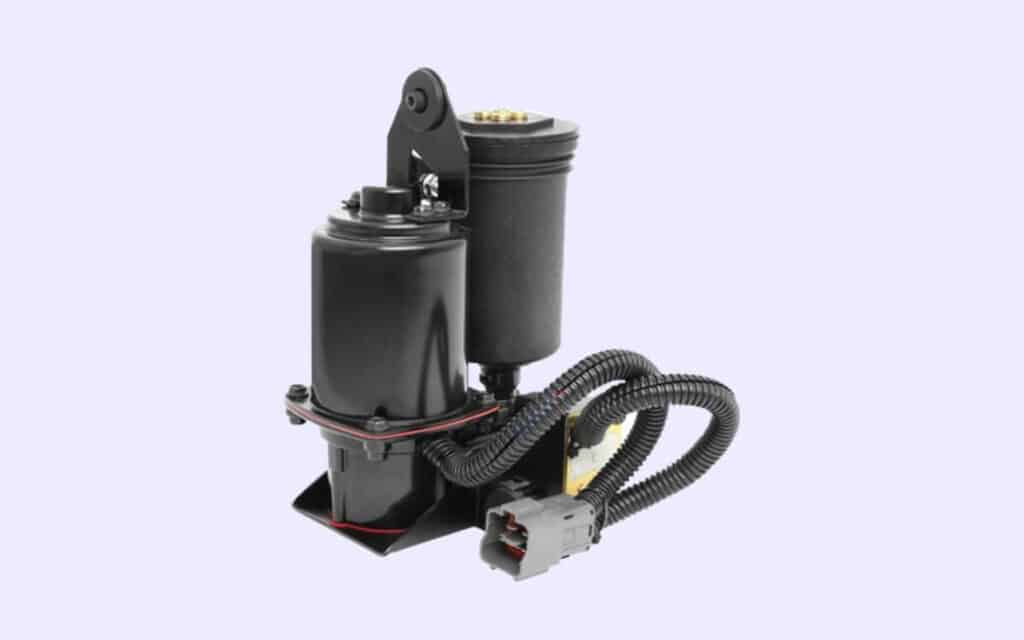A suspension air compressor is an essential component of a vehicle’s air suspension system that helps to maintain the proper ride height and level of the vehicle. In this article, we’ll discuss what a suspension air compressor is, how much it will cost to replace it in Canada, the symptoms of a faulty suspension air compressor, and how to make it last longer.
What is a Suspension Air Compressor?
A suspension air compressor is a device that compresses air and sends it to the air springs or bags in a vehicle’s air suspension system. The compressor helps maintain the proper level and ride height of the vehicle, providing a smoother and more comfortable ride.
How Much Will it Cost to Replace a Suspension Air Compressor in Canada?
The cost of replacing a suspension air compressor in Canada can vary depending on the make and model of the vehicle, the type of compressor needed, and the location of the repair shop. On average, you can expect to pay between $1000 and $4000 for parts and labor. The labor time for this repair typically takes 2-4 hours.

What are the Symptoms of a Faulty Suspension Air Compressor?
Several symptoms can indicate a problem with your vehicle’s suspension air compressor. Being aware of these warning signs can help you identify issues early and take necessary action to prevent further damage. Some common symptoms include:
1. Uneven ride height: One of the most noticeable signs of a faulty suspension air compressor is an uneven ride height, with one side of the vehicle sitting lower than the other. This can be caused by the compressor’s inability to maintain the correct air pressure in the air springs.
2. Sagging suspension: If the air compressor is not functioning correctly, the air springs may not receive enough pressure, causing the suspension to sag. This can result in a vehicle that sits lower than usual, particularly when parked or carrying heavy loads.
3. Noisy compressor operation: A suspension air compressor that is struggling to maintain air pressure may produce excessive noise during operation, such as a loud whirring or grinding sound. This can be an indicator of internal component wear or damage.
4. Longer compressor run times: If the air compressor is taking longer than usual to inflate the air springs, it may be a sign of reduced efficiency or an impending failure.
5. Warning lights: Many modern vehicles have sensors that monitor the air suspension system. If a problem is detected, a warning light may appear on your dashboard, alerting you to an issue with the suspension air compressor or another component of the system.
6. Poor ride quality: A malfunctioning suspension air compressor can lead to reduced ride comfort, with the vehicle feeling bumpier or less responsive, particularly on rough or uneven road surfaces.
7. Decreased handling and stability: As previously mentioned, a faulty air compressor can affect your vehicle’s handling and stability, making it more challenging to maintain control during turns or when driving at higher speeds.
If you notice any of these symptoms, it’s essential to have your vehicle’s air suspension system inspected by a professional mechanic to diagnose the issue and determine whether the suspension air compressor needs repair or replacement.
How Long Does a Suspension Air Compressor Last?
The lifespan of a suspension air compressor can vary depending on the make and model of the vehicle, the driving conditions, and the quality of the components. On average, they can last between 100,000 and 150,000 kilometers.
How Can a Suspension Air Compressor Become Defective?
There are several factors that can contribute to the failure of a suspension air compressor. Some of the most common reasons include:
1. Wear and tear: Like any mechanical component, suspension air compressors are subject to wear and tear over time. Continuous use, combined with the stress of inflating and deflating air springs, can eventually cause the compressor’s internal components to wear out, leading to reduced efficiency or complete failure.
2. Moisture damage: Air compressors can be susceptible to moisture damage, especially if the air dryer or desiccant is not functioning correctly. Excess moisture can cause rust and corrosion in the compressor, reducing its efficiency and eventually leading to failure.
3. Overheating: Suspension air compressors generate heat during operation, and if the cooling system is not working correctly, it can lead to overheating. Prolonged exposure to high temperatures can damage internal components, reducing the compressor’s lifespan and leading to failure.
4. Electrical issues: The suspension air compressor relies on electrical components to function correctly. Faulty wiring, blown fuses, or a damaged control module can cause the compressor to malfunction or fail entirely.
5. Contamination: Dirt, debris, or other contaminants can enter the compressor through damaged air filters or leaks in the system. Over time, these contaminants can cause damage to the compressor’s internal components, affecting its performance and eventually leading to failure.
6. Leaks in the air suspension system: If there are leaks in the air springs or other parts of the air suspension system, the compressor will have to work harder and more frequently to maintain the desired ride height. This added stress can cause the compressor to wear out prematurely.
Regular maintenance and inspection of your vehicle’s air suspension system can help identify potential issues early on and prevent the suspension air compressor from becoming defective. By addressing problems promptly, you can extend the life of the compressor and maintain your vehicle’s performance and ride quality.

How Can a Faulty Suspension Air Compressor Affect the Car’s Performance?
A faulty suspension air compressor can have a significant impact on your car’s performance in several ways:
1. Ride comfort: A malfunctioning air compressor can result in an uneven distribution of air pressure in the air springs, causing your vehicle to have an uncomfortable and bumpy ride. This can be particularly noticeable on rough or uneven road surfaces.
2. Handling and stability: As mentioned earlier, an uneven ride height due to a faulty compressor can cause your car to lean to one side, negatively affecting its balance. This can compromise handling and stability, making it challenging to maintain control, especially during turns or when driving at higher speeds.
3. Acceleration and braking: A compromised suspension system can also impact your vehicle’s acceleration and braking performance. An uneven distribution of weight can cause uneven tire wear and reduce the contact patch with the road, leading to decreased traction and longer stopping distances.
4. Increased wear on suspension components: A faulty air compressor can cause excessive wear and tear on other suspension components, such as air springs, shocks, and struts. This can lead to additional costly repairs and even further degrade your car’s performance if not addressed promptly.
5. Reduced fuel efficiency: A poorly functioning suspension system can cause your vehicle’s weight distribution to shift, potentially increasing drag and negatively impacting fuel efficiency.
Is it Safe to Drive with a Faulty Suspension Air Compressor?
Driving with a faulty suspension air compressor is not recommended, as it can compromise the stability and handling of your vehicle. A malfunctioning compressor can lead to an uneven ride height, causing the car to lean to one side and affecting its balance. This imbalance can make it difficult to maintain control, especially during turns or when driving at higher speeds.
Moreover, a defective suspension air compressor can cause excessive wear and tear on other suspension components, such as shocks and struts, leading to additional costly repairs. To ensure your safety and the well-being of your vehicle, it’s best to address a faulty suspension air compressor as soon as possible and avoid driving until the issue is resolved.
How Can I Make My Suspension Air Compressor Last Longer?
Here are some tips to help prolong the lifespan of your suspension air compressor:
• Avoid overloading the vehicle
• Keep the air suspension system well-maintained with regular inspections and repairs
• Use high-quality components to ensure a longer lifespan

Conclusion
The suspension air compressor is a critical component of a vehicle’s air suspension system that helps maintain the proper level and ride height of the vehicle. If you notice any of the symptoms listed above, it’s important to have your suspension air compressor inspected and repaired as soon as possible to prevent further damage and safety issues. While the cost of replacement may vary, it’s a relatively simple repair that can help prolong the lifespan of your vehicle and keep you safe on the road.
Next Steps
Book Your Suspension Air Compressor Replacement
The service most frequently booked by those who read this article is Suspension Air Compressor Replacement. Uchanics’ expert technicians make the process even more convenient by bringing the service right to your doorstep. We perform this job at your home or office, covering over 40 cities in Ontario, including Oshawa, Ajax, Toronto, Scarborough, Mississauga, Brampton, and more. Our commitment to excellence has earned us more than 700 glowing 5-star reviews. Choose Uchanics for your suspension air compressor replacement and experience unparalleled convenience and top-quality service.
